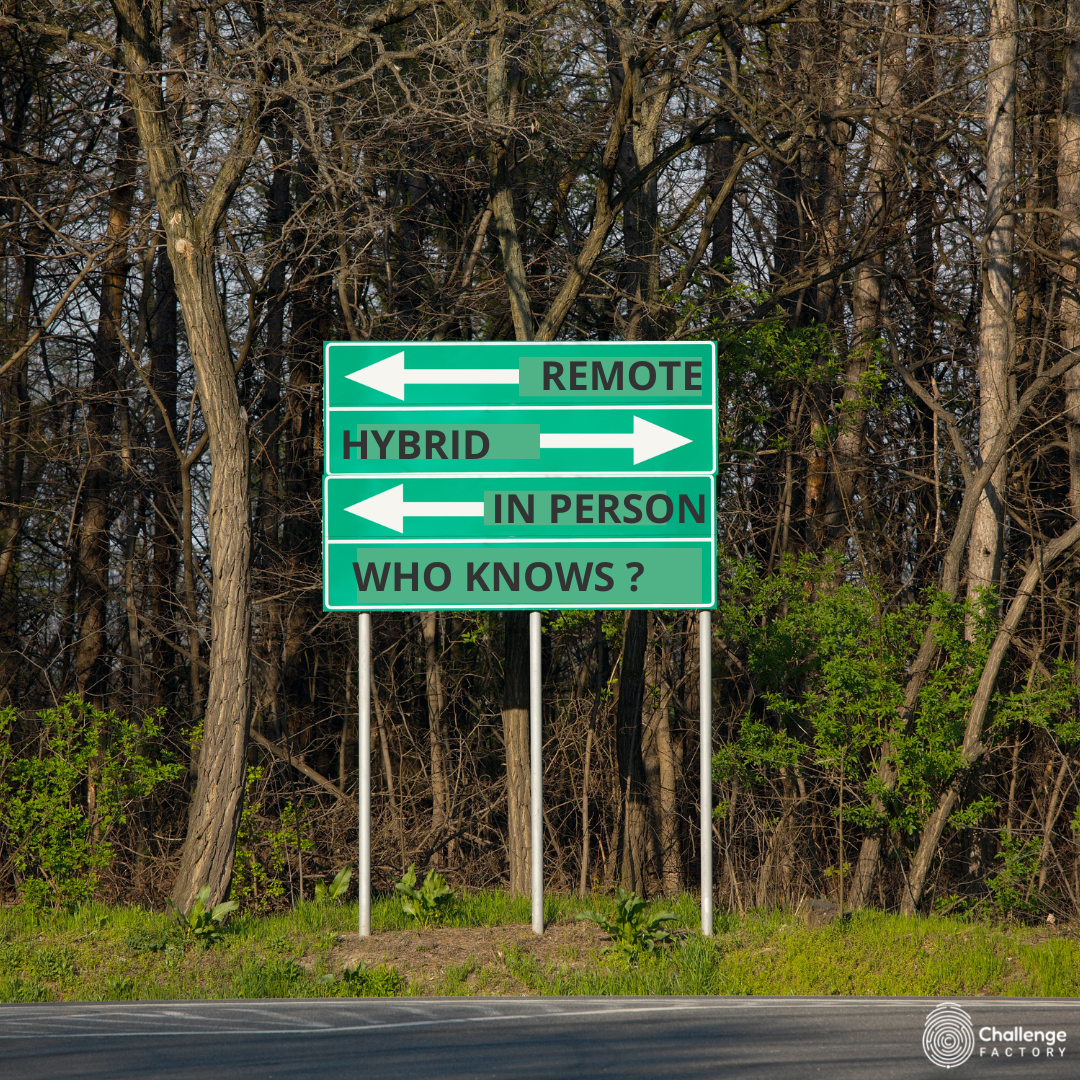The last couple of years have seen organizations looking to any and all sources of information for how to navigate pandemic decisions…including university grads going through the hiring process for the first time.
Unexpected questions in pandemic job interviews
I recently joined Challenge Factory’s team as a Research Associate. Prior to this, I went through the job search ritual of every recent graduate: endless cover letters, emails, and online interviews.
When preparing for interviews, I always practiced answers to common interview questions, including what my strengths, weaknesses, and goals for the future are. The question that I didn’t prepare myself for—or expect I’d be asked!—was whether I needed to work in person or in a hybrid setting.
It felt like a trick question.
Going into an interview, I didn’t usually know what the organization’s work model was. Few of the organizations I applied to made this information available to find during online research. I worried that whatever answer I gave wouldn’t align with their current model, and as a result I’d be an unsuccessful candidate. But their perspective might have been similar to mine. In a tight labour market, employers may be concerned about their job offers being rejected if they have the “wrong” work model.
Even more unexpectedly, some interviewers asked about the work models being used by the other organizations I was being interviewed at. Interviewers also told me they were still ‘test driving’ various hybrid or in-person models. Were they looking to me for intel or was this a different kind of ‘test’?
It became clear that many leaders lack the confidence to make a definitive decision for their organizations and are waiting to see what models emerge as the most popular way to work.
Interviews like this reminded me of my Master’s degree experience during the pandemic. When meeting students from other universities, our conversations often began with, “Are you studying in person or online?” Schools developed reputations depending on their reactions to COVID-19 early on, if they used the same safety measures as other schools in the area, or how often they switched from online to in-person as waves came and went.
Schools that were clear in their intention, consistent in their approach, and transparent in their communication were more respected, even if the decisions didn’t always align with personal preference.
Reactionary, inconsistent, and confusing responses are still happening in organizations that aren’t sure what works best for them. As a young person entering the workforce, I ask myself, “Shouldn’t these leaders know what culture they want, and have the confidence to make a decision more than two years into the pandemic?”
Culture became a decisive factor in my job search
At this stage of the pandemic, when it comes to workplace safety, working in an office can now be an option for many people.
From the perspective of a jobseeker, however, many organizations haven’t committed to a clear work model yet—whether that model is in-person, hybrid, fully remote, or something else. Their operational choices are being influenced by those around them, which means their culture is also being influenced by those around them.
“Your culture is the reason why people join, stay, and thrive in your organization,” explains my new colleague Emree Siaroff in a Workforce Architecture article about Culture Blueprints. “Culture is a combination of written and unwritten rules, norms, beliefs, behaviours, and values. It is how work gets done, how people interact with each other, and how they see their organization’s place in the world.”

During my job search, I just wanted to know what organizations are doing. This would give me insight into what it’s like to work there, helping me decide if it’s right for me. Being asked about the operations of other organizations made me feel as though the prospective employer was looking for confirmation that they were using the “right” work model, without understanding what worked best for their own people and organization long-term.
Eventually, I developed a tendency to only apply for roles at companies that took a clear stance on their work model in the job description. The clear stance was what made them attractive, not the actual model or policy. It was an indicator that the employer was confident in their work culture and intentional about understanding their employees’ needs.
Is hybrid the best model?
I don’t know, and other jobseekers won’t either.
More importantly, the question that companies should be asking themselves is, “Is hybrid the best model for us, right now?”
For some organizations and people, working in person is more beneficial. Remote work allowed me to begin a job based in Canada while still living in Belgium (where I attended grad school). I’m thankful for the opportunity I wouldn’t have had otherwise. I chose this Research Associate position in part because Challenge Factory spoke openly about their flexible work model, which they were using long before the pandemic.


Check out Challenge Factory’s free decision tree that helps leaders ask better questions and tackle COVID-19 policy changes.
Explore Workforce Architecture, our digital magazine and research exchange for the changemakers and trailblazers driving innovation in the world of work.
Emily Schmidt is a Research Associate at Challenge Factory. She has a Master’s degree from the Brussels School of Governance and enjoys exploring new challenges through qualitative research.

